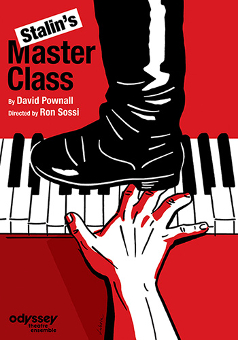A DICTATOR DICTATES MUSIC IN STALIN’S MASTER CLASS
In a time when politics collide with state and federal budgets for the arts, Stalin’s Master Class — a wildly comic, music-filled ride by British playwright David Pownall — is all too relevant for today’s audiences. Odyssey Theatre Ensemble founding artistic director Ron Sossi helms with his unique sense of the absurd around the issue of art vs. government control when “Father of the People” Joseph Stalin and Soviet cultural minister Andrei Zhdanov summon composers Sergei Prokofiev and Dmitri Shostakovich to the Kremlin to demand triumphant patriotic music that would glorify Stalin and the Soviet Union, not this noisy music which they knew expressed the terror, fear, and frustration of living in Stalinist Russia.
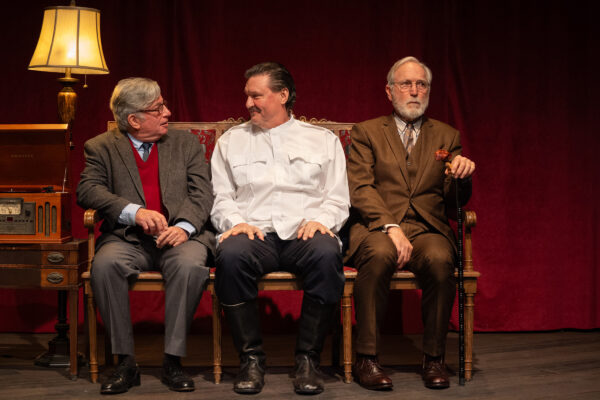 Randy Lowell, Ilia Volok, Jan Munroe
Randy Lowell, Ilia Volok, Jan Munroe
Stalin was responsible for the death of 30 million Russians. In 1937 and 1938, 1.5 million people were arrested and 668,000 were killed, averaging 880 executions a day. Around that time, Shostakovich, whose fourth symphony was prohibited from being performed by Russian authorities, saw friends disappearing. His colleagues, patrons and members of his family were arrested and shot, including his brother-in-law, his mother-in-law and his uncle. In 1948 Stalin persecuted Shostakovich again. A formal decree was announced naming the three most prominent Russian composers of the day, Prokofiev, Shostakovich, and Khachaturian as enemies of the people for writing music that went against Soviet ideals. Shostakovich lost his teaching positions and his music was banned.
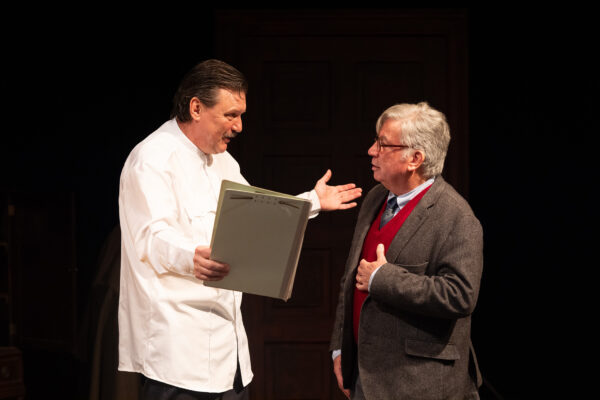 Ilya Volok and Randy Lowell
Ilya Volok and Randy LowellThis imaginary tale is set in 1948 when the notorious conference of Soviet musicians took place, with the Central Committee of the All-Union Communist Party (Bolsheviks) giving composers a condemnation of the avant-garde. However, government support would be granted for a return to safer, more conventional musical forms. The play offers an insider’s look at the notorious tyrant behind the Kremlin’s closed doors where we see the villainous leader through the lens of artistic expression and his internal emotional turmoil about the 20 million soldiers, “a whole generation of young men,” who gave their lives in service to him and his political beliefs.
 Jan Munroe and Ilia Volok
Jan Munroe and Ilia VolokPownall explained that, in writing Stalin’s Master Class, he wanted to convey the feelings of horror and mockery he felt after reading the minutes of the 1948 Moscow Composers’ Conference held by the Communist party. Although the meeting of the four men imagined in the play never actually took place, the composers’ conference and other events did, making the evening’s goings-on only “too depressingly real.” In his darkly comedic satire, Pownall examines if artistic expression can be forced to conform to political ideology, with the themes raised about the relationship between art and politics universally relevant.
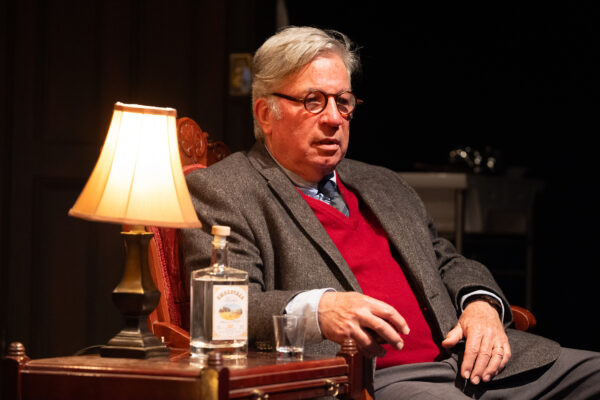 Randy Lowell
Randy LowellThe ensemble piece centers around a chilling encounter between renown Russian composers Prokofiev, played by Jan Munroe who perfectly embodies the composer and his keyboard brilliance (played offstage by musical director Nisha Sue Arunasalem) and Shostakovich, a rightfully shaky and apprehensive Randy Lowell, both of whom are summoned to be subjected to the rants and bullying of Stalin (a tour-de-force Ilia Volok) and his powerful toady Zhdanov (big and burly John Kayton). Both men accuse the composers of anti-democratic “formalist” musical tendencies that are alien to the Soviet people and their own artistic tastes.
 Jan Munroe, Randy Lowell, Ilia Volok
Jan Munroe, Randy Lowell, Ilia VolokWith post-war Soviet society the backdrop for Stalin’s Master Class, Stalin proclaims that the current trend in modern music “could make a whole population sick!” Then he accuses Prokofiev of writing music that is too emotional, and Shostakovich for music that is too dark and miserable to the soul. So, how will these two composers work together to create music appropriate to the taste of this multi-sided dictator?
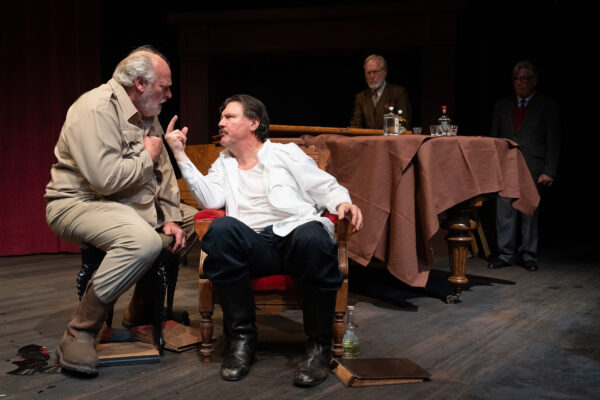 John Kayton, Ilya Volok, Jan Munroe and Randy Lowell
John Kayton, Ilya Volok, Jan Munroe and Randy LowellOnce convinced they can work together (rather than suffer the consequences), the two great composers are forced to sit at the piano and compose music unlike any they have done before (or together) as Stalin dictates exactly what he wants, even sitting down and playing the piano to the astonishment of the others. But what will stick in your mind, as it does mine, is the way in which Stalin convinces Prokofiev to do his bidding, demanding the composer select his favorite recording of his work from Stalin’s impressive record collection from around the world. When the elderly, cane-assisted composer replies he cannot bend over to see all the records, Stalin kicks the cane from under him, causing the composer to fall on the floor – and then the dictator chides him with, “You can see better from there,” and walks away to drink yet another glass of vodka.
Jan Munroe and Ilia Volok
Of course, Stalin hates every single one of the recordings, throwing each to the floor as it is presented to him to play. The emotionally filled breaking of every disc from the collection as both composers are forced to watch, with Prokofiev wincing at the destruction of each one, will leave you gasping at the gall of such a treacherous dictator. Both actors are to be commended for their gut-wrenching portrayals throughout the play, but especially here given the long faces of audience members during intermission which spoke volumes as to the emotional impact of the Act 1 final scene.
Jan Munroe
Insults are hurled at the younger Shostakovich, brilliantly portrayed by Lowell as the shy and terrified composer hoping to escape with his life. When Stalin stoops to calling him “a pansy,” the composer finally lets his backbone show, even though the verbal encounter forces him into the bathroom to be sick. And yet when he returns, Stalin again begins harping at the two men as they are forced to the piano to start composing together, even though they musical styles are diametrically opposed.
lya Volok, Randy Lowell, John Kayton and Jan Munroe
Kayton is the first to appear onstage as the play opens, preparing himself to welcome the composers to the meeting. Thus, we meet the proud former soldier in all his righteous glory, ready to assist his “leader” in getting exactly what he wants, not only from the two composers but the rest of the world as well, thus securing his place in history as a great war hero. Kayton starts out solid and ready to play his part during the meeting, but as Stalin forces his underling to drink vodka, Kayton becomes vulnerable as the evening takes its toll on Zhdanov, a proud man with a failing body.
John Kayton and Ilya Volok
The creative team includes scenic designer Pete Hickock; lighting designer Jackson Funke, who adds emotionally impactful spotlights when Volok comes downstage and speaks directly to the audience; sound designer Christopher Moscatiello; costume designer Mylette Nora; graphics designer Luba Lukova; and props designer Jenine MacDonald whose task of finding enough breakable discs for the run is to be commended.
Ilia Volok and John Kayton
“I’ve always been fascinated by the nature of so-called ‘evil people’,” explains Sossi. “What makes them tick? Do they see themselves as evil, or do they see themselves as doing the right thing? In , you see a side of Stalin that is very patriotic, a man who wants to resuscitate his country. He wants to get these guys to write music that is more accessible and comforting to the sad survivors of the devastating World War, the children and the old people. The play is very funny, which some might find disturbing.”
Ilia Volok
photos by Jenny Graham
Stalin’s Master Class
produced by Beth Hogan in association with Isabel and Harvey Kibel
Odyssey Theatre Ensemble, 2055 S. Sepulveda Blvd
Fri & Sat at 8; Sun at 2
ends on June 2, 2024
for tickets ($20–$40), call 310.477.2055 or visit Odyssey Theatre
Fridays: Pay-What-You-Can followed by complimentary wine and snacks
arrive early for onsite free parking as different plays take place in all three theaters at the venue
